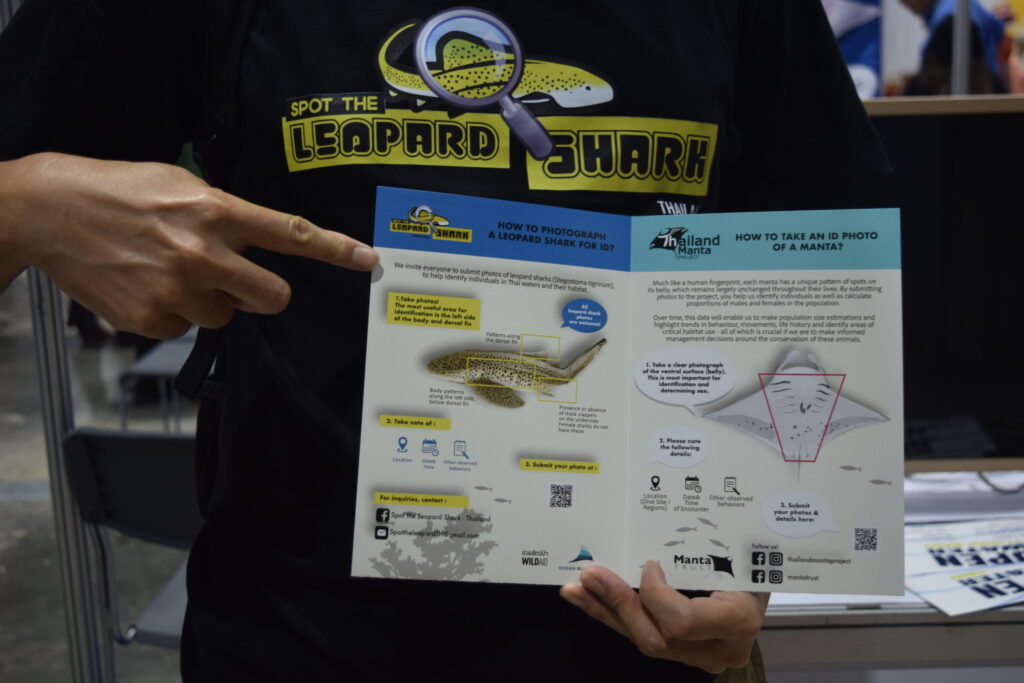Rebuilding confidence to advance shark conservation in Thailand
Sharks are more than just ocean predators — they are essential to maintaining balance in marine ecosystems as well as support livelihoods. In Thailand, their presence has supported diving tourism, where encounters with these graceful animals are considered highlights beneath the waves. Across the Gulf of Thailand and the Andaman Sea, three species in particular have become icons for visitors and divers alike: the whale shark (Rhincodon typus, Endangered), the Indo-Pacific leopard shark (Stegostoma tigrinum, Endangered), and the blacktip reef shark (Carcharhinus melanopterus, Vulnerable). Yet these encounters are becoming increasingly rare. Overfishing and habitat degradation have driven serious population declines, threatening not only the health of the ocean but also the coastal communities whose livelihoods depend on vibrant marine tourism. Safeguarding these species requires a deeper understanding of their movements, habitat use, and breeding grounds to be able to plan effective management and conservation action – knowledge that has historically been difficult to obtain without the support of technologies.
Divers and dive operators at Thailand Dive Expo event held in 2024 showing photo of Indo-Pacific leopard shark, an iconic shark in Thailand, from various dive sites in Thailand. Photo ©WildAid / Ocean Blue Tree
Despite strong government efforts to protect sharks — such as declaring the whale shark and Indo-Pacific leopard shark as protected species and enacting National Plan of Action for Shark — research has been hindered by limited use of telemetry, a technique that helps track animal movements and identify important habitats. While citizen science is growing in Thailand and has provided valuable insights, much of the data remains concentrated around popular dive sites, leaving vast areas unexplored. Public confidence in tagging has also faced hurdles, as past experiences raised concerns about the safety of certain tagging methods. This has made it all the more important to demonstrate that tagging can be carried out responsibly, with animal welfare as the top priority.

WildAid Staff showing citizen science pamphlet distributed during 2024 Thailand Dive Expo Event to promote data submission from divers and dive operators. Photo © WildAid / Ocean Blue Tree
At the same time, shark telemetry has not yet been widely integrated into university curricula, leaving many young researchers and marine veterinarians with limited opportunities for hands-on training. Without these tools and expertise, conservation planning, from identifying key breeding areas to designing spatial protections, remains challenging.
To address this gap, we launched a workshop in May 2025, co-supported by the Save Our Seas Foundation, Ocean Blue Tree, and WildAid. The event organized by WildAid Thailand, Thai Sharks and Rays, and Thai Whale Shark brought together 50 participants from government officers from Thailand’s key conservation agencies — the Department of Marine and Coastal Resources, the Department of National Parks, and the Department of Fisheries — along with university lecturers, sport anglers, marine biologist, conservation advocates, and representatives from private aquariums. By combining knowledge, practical experience, and collaboration, the workshop aims to build confidence in tagging methods and strengthen shark conservation efforts across Thailand, and create freely accessible online courses to ensure that learning extends beyond the classroom and reaches a wider audience.
